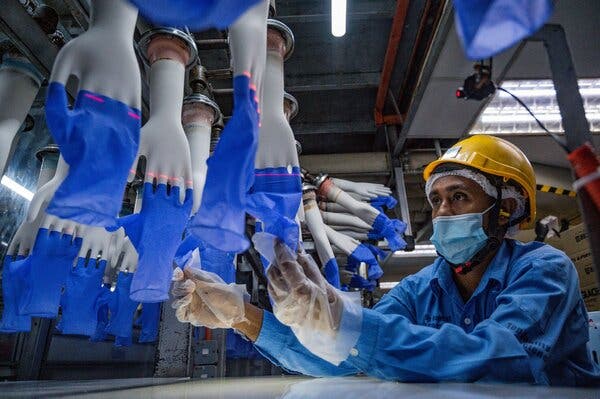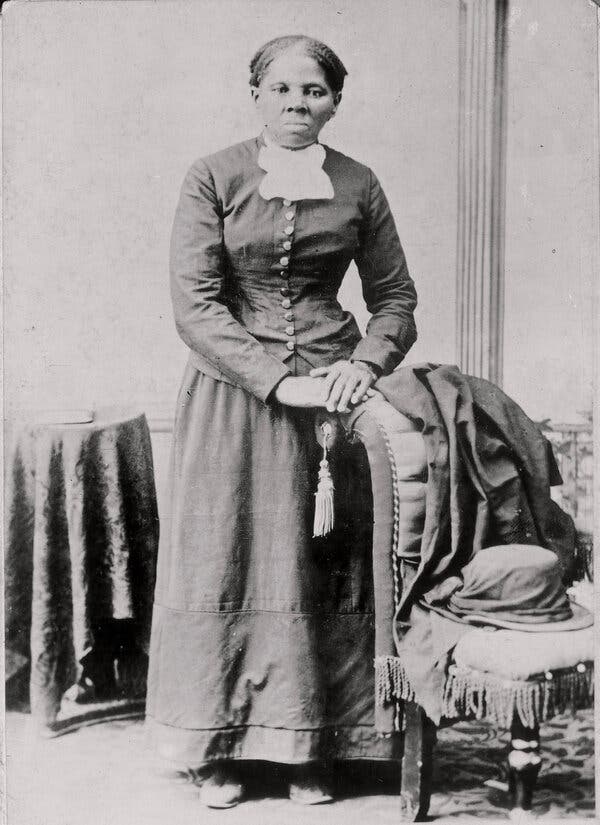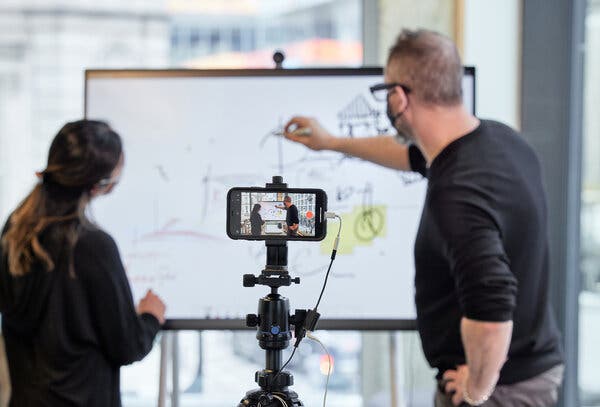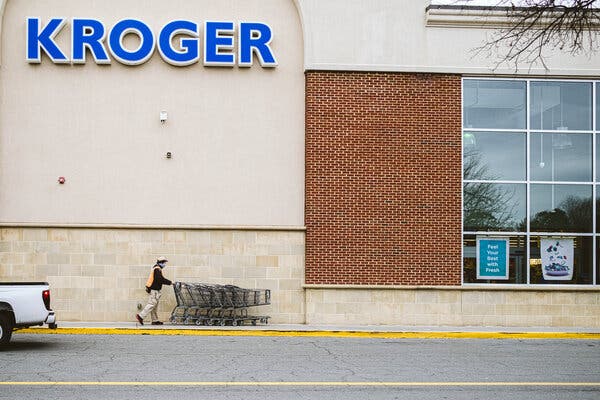The counting of votes that will determine whether a union can form at an Amazon warehouse in Bessemer, Ala., begins Tuesday. But the results of the union election, one of the most consequential in recent memory, may not be known until later this week or early next week because the vote can often involve a painstaking process that will be closely scrutinized by representatives from the union and Amazon.
The ballots, which were mailed out to workers in early February, must be signed and had to be received by the National Labor Relations Board at its Birmingham office by the end of Monday.
First, a staff member at the labor board will read the names of the workers, without opening an inner envelope with the actual ballot. Representatives from the union and Amazon will be on a private video conference. As each name is read, they will check the workers’ names against a staff list, and if either side contests whether that worker was eligible to vote, that ballot will be set aside. A representative from each side is also expected to be there in person to observe the process.
After the two sides have had the opportunity to make their objections about eligibility, the N.L.R.B. will begin counting the uncontested ballots. After every 100 votes, the labor board will count those ballots again until all the votes are counted. This portion will be open to reporters on a video conference line.
A finding of more contested ballots than uncontested is likely to set off legal arguments by the Retail Warehouse and Department Store union, which has led the organizing drive, and Amazon over the eligibility of each contested ballot. Each side has about a week to make its case before N.L.R.B. certifies the vote.
Either side can contest whether the vote was conducted fairly. The union, for instance, could argue that the company took steps to improperly sway the vote, by potentially making workers fearful of reprisal if they supported organizing.
If the union prevails, workers fear that the company may shut down the warehouse. Amazon has backed away from locations that brought it headaches before.
But the company has committed more than $360 million in leases and equipment for the Bessemer warehouse, and shutting down the vote of a large Black work force could publicly backfire, said Marc Wulfraat, a logistics consultant who closely tracks the company.

United States Customs and Border Protection has ordered port officials to seize disposable gloves made by the world’s largest rubber glove maker, a Malaysian company that the agency says uses forced labor in its factories.
Customs and Border Protection said in a statement on Monday that it had “sufficient information to believe” that the company, Top Glove, “uses forced labor in the production of disposable gloves.”
Last July, the agency issued an import ban on products from two Top Glove subsidiaries because they were suspected of using forced labor. On Monday, it said it had determined that rubber gloves produced by the company with forced, convict or indentured labor “are being, or are likely to be, imported into the United States.”
Based on that determination, the agency said in a notice, it had authorized U.S. port directors to seize the gloves and start forfeiture proceedings unless importers can produce evidence showing that the gloves were not produced with prohibited labor.
The notice was the result of a monthslong investigation “aimed at preventing goods made by modern slavery from entering U.S. commerce,” Troy Miller, the acting commissioner of Customs and Border Protection, said in a statement.
The agency, he said, “will not tolerate foreign companies’ exploitation of vulnerable workers to sell cheap, unethically made goods to American consumers.” He added that the agency had “taken steps to ensure” that the enforcement action would not significantly affect total imports of disposable gloves into the United States.
After the import ban on Top Glove subsidiaries last summer, officials at the company said they were upgrading their worker dormitories and paying restitution to affected workers.
The company said in a statement on Tuesday that it was in touch with the U.S. agency and hoped to “resolve any ongoing areas of concern immediately.”
Top Glove also said it had engaged a independent labor consultancy from Britain since last July. That consultancy, Impactt Limited, said in a statement this month that its latest investigations had not turned up any “systemic forced labor” among the company’s direct employees.
But Andy Hall, a labor rights campaigner based in Nepal, said on Tuesday that Top Glove “remains an unethical company whose factories and supply chain continue to utilize forced labor,” and one that prioritizes profits and production efficiency over its workers’ basic rights.
Mr. Hall said he welcomed the Customs and Border Protection notice, and that the next step would be holding the company’s owners and investors to account.
Top Glove controls roughly a quarter of the global rubber glove market and has 21,000 employees. Many of them come from some of Asia’s poorest countries — including Bangladesh, Myanmar and Nepal — and live and work in crowded conditions.
The company has enjoyed record profits during the pandemic, even though thousands of its low-paid workers in Malaysia suffered from a large coronavirus outbreak last year.

Dapper Labs, the blockchain company that has pushed digital collectibles known as NFTs, for nonfungible tokens, said on Tuesday that it had raised $305 million in new funding.
The company, which has a partnership with the National Basketball Association, created an online marketplace called N.B.A. Top Shot in October where sports fans can buy, sell and collect digital “moments” — essentially, video clips of basketball players. But unlike most basketball highlights that can be found on YouTube or ESPN, these moments are on a blockchain, a digital ledger that records cryptocurrency transactions, which makes it possible for fans to buy, collect and exchange them like trading cards.
Top Shot has exploded in popularity, part of a larger frenzy for cryptocurrencies and NFTs that has driven up the value of Bitcoin and led to head-turning bids for digital artwork. There have been more than three million Top Shot transactions, Dapper Labs said, generating $500 million in sales. The company makes money through the sale of the digital moments and also collects a cut whenever a moment is resold.
The new funding values Dapper Labs, which is based in Vancouver, British Columbia, at $2.6 billion. It is the biggest financing for the company, which had previously raised $52.5 million.
Investors in the new funding include the venture capital firm Andreessen Horowitz, the hedge fund Coatue Management and former and current N.B.A. stars including Michael Jordan, Kevin Durant, Kyle Lowry and Klay Thompson, as well as celebrities like Will Smith and Ashton Kutcher.
Roham Gharegozlou, the Dapper Labs founder and chief executive — who also created the 2017 blockchain game CryptoKitties — said Top Shot had “catalyzed” the excitement surrounding NFTs.
“I think N.B.A. Top Shot is proving that these platforms are ready for prime time,” he said.
Mr. Gharegozlou said the new funding would go toward partnerships with other sports leagues like the Ultimate Fighting Championship, the mixed martial arts organization. He said the company would also hire more employees and fund NFT ventures made by other start-ups.

On the first day of the Biden presidency, Jen Psaki, the White House press secretary, said that the Treasury Department was “taking steps to resume efforts” to put the abolitionist Harriet Tubman on the $20 bill. “It’s important that our money reflects the history and diversity of our country,” Ms. Psaki said.
But it will probably be years before we see the Underground Railroad conductor gracing U.S. currency, the DealBook newsletter reports.
The reason? The deadline for printing a new version of the $20 bill is 2030. It was set by an anti-counterfeiting committee in 2013, two years before Tubman won a campaign to replace President Andrew Jackson on the bill.
“The primary reason currency is redesigned is for security against counterfeiting,” Lydia Washington, a representative for the Bureau of Engraving and Printing, told DealBook. “The redesign timeline is driven by security feature development.”
The Obama administration said that a design “concept” would be unveiled by 2020, to coincide with the centennial of the 19th Amendment, which gave women the right to vote. Extensive redesign work was reportedly done, but in 2019, President Donald J. Trump’s Treasury secretary, Steven Mnuchin, said the project would be delayed until at least 2026. (Insiders said they had always doubted that the 2020 deadline could be met).
It turns out that the complex design and testing process for currency cannot be hurried. “No final images have been selected,” Ms. Washington said. The Treasury Department did not respond to a request for comment.

-
Wall Street opened lower on Tuesday, as bond yields jumped higher.
-
The S&P 500 was down 0.3 percent in morning trading, and the tech-focused Nasdaq Composite declined 0.7 percent.
-
In bond markets, attention was returning to the pace of the economic recovery in the United States as more details of President Biden’s clean energy and infrastructure spending plans emerged, including a huge expansion of offshore wind energy along the East Coast. A $3 trillion economic package is in the works, on the heels of the $1.9 trillion economic recovery bill.
-
Bond prices dropped, sending yields on 10-year bonds sharply higher. The yield on U.S. Treasury notes rose 5 basis points, or 0.05 percentage point, to 1.76 percent, the highest since January 2020. Faster economic growth is likely to lead to higher prices, which reduces the appeal of bonds.
-
Most European stock indexes rose, with the Stoxx Europe 600 up 0.5 percent. Data published on Tuesday showed an increase in inflation in Spain and Germany, while an index of economic confidence for the eurozone in March was at its highest level since before the pandemic.
-
Oil prices fell. Futures of West Texas Intermediate, the U.S. crude benchmark, fell 1.5 percent to $60.61 a barrel. With the Suez Canal now unblocked, focus shifted to the meeting of the Organization of the Petroleum Exporting Countries and its allies beginning Thursday to decide on production quotas for May. In early March, OPEC decided to keep the tighter quotas the same for April.
-
“Much as the Suez Canal is seeing traffic return progressively to normal, it seems that bond markets are returning to pricing the economic recovery,” analysts at ING wrote, referring to the rise in bond yields. They also warned that traders and investors settling positions for the end of the first quarter would affect market prices this week.
-
Shares in the Swiss bank Credit Suisse and the Japanese bank Nomura extended their deep declines slightly from Monday, when the banks said they faced losses as they tried to exit positions tied to an American hedge fund, Archegos.
-
The British pound rose 0.2 percent against the euro to the strongest level in 13 months as England’s lockdown restrictions were eased slightly on Monday.

As company heads are once again planning for a return to the office, it is not only safety measures but also the new work arrangements that are driving discussions about the post-pandemic workplace. More than 80 percent of companies are embracing a hybrid model whereby employees will be in the office three days a week, according to a new survey by KayoCloud, a real estate technology platform.
Workplaces are being reimagined for activities benefiting from face-to-face interaction, including collaboration on projects, Jane Margolies reports for The New York Times.
Common areas will be increased and equipped with furniture that can be moved as needs change. Steelcase and Knoll, suppliers of office furniture, report strong interest in mobile tables, carts and partitions.
As the amount of space devoted to gathering expands, the fate of one’s own personal turf at the office — a desk decorated with family photos, a couple of file cabinets — hangs in the balance. In some cases, personal desks are being replaced with “hoteling” workstations, also called hot desks, which can be used by whoever needs a place to touch down for a day.
Conference rooms, too, are getting a reboot. Companies are puzzling over how to give remote workers the same ability to participate as those who are physically present. There are even early discussions about using artificial intelligence to conjure up holographic representations of employees who are off-site but could still take a seat at the table. And digital whiteboards are likely to become more popular, so workers at home can see what’s being written in real time.

Retail and fast-food workers feel newly vulnerable in states like Mississippi and Texas, where governments have removed mask mandates before a majority of people have been vaccinated and while troubling new variants of the coronavirus are appearing.
It feels like a return to the early days of the pandemic, when businesses said customers must wear masks but there was no legal requirement and numerous shoppers simply refused, Sapna Maheshwari reports for The New York Times. Many workers say that their stores do not enforce the requirement, and that if they do approach customers, they risk verbal or physical altercations.
For many people who work in retail, especially grocery stores and big-box chains, the repeals of the mask mandates are another example of how little protection and appreciation they have received during the pandemic. They were praised as essential workers, but that rarely translated into extra pay on top of their low wages. Grocery employees were not initially given priority for vaccinations in most states, even as health experts cautioned the public to limit time in grocery stores because of the risk posed by new coronavirus variants. (Texas opened availability to everyone 16 and older on Monday.)
The differing state and business mandates have some workers worried about more confrontations. Refusing service to people without masks, or asking them to leave, has led to incidents in the past year like a cashier’s being punched in the face, a Target employee getting his arm broken and the fatal shooting of a Family Dollar security guard.
Emily Francois, a sales associate at a Walmart in Port Arthur, Texas, said that customers had been ignoring signs to wear masks and that Walmart had not been enforcing the policy.
“I see customers coming in without a mask and they’re coughing, sneezing, they’re not covering their mouths,” said Ms. Francois, who has worked at Walmart for 14 years and is a member of United for Respect, an advocacy group. “Customers coming in the store without masks make us feel like we aren’t worthy, we aren’t safe.”





